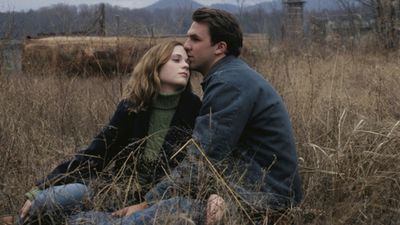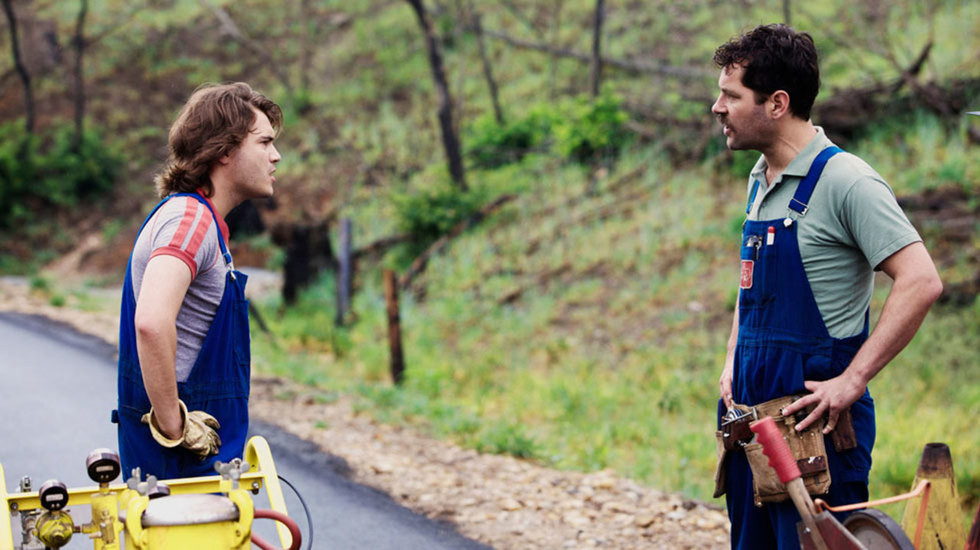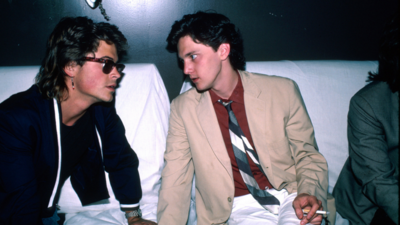
BY KAREN KEMMERLE |
David Gordon Green on ‘Prince Avalanche’ and Location Scouting with Nicolas Cage
One of Hollywood’s most multi-faceted auteurs, David Gordon Green sat down to talk with us about his latest project, his reluctant manhood and the challenges of remaking a movie.

Tribeca: Prince Avalanche is a remake of an Icelandic movie called, Either Way. What about that film made you want to adapt it for American audiences?
David Gordon Green: Well it started with the location. I found a place that I thought would be perfect for a two character film—a road in this burnt down state park in Austin. I wanted to make this movie quickly. I remember back in February 2012, I began to describe the idea I had to a friend. He told me that I should just remake this Icelandic movie. It sounded perfect.
So I literally watched Either Way for the first time with the intention of remaking it. And it’s a great movie. The movies are distinct but clearly similar in many ways. Sometimes I’d lift a shot from Either Way to capture its essence. Utimately, I really wanted to make a two person character piece that is reallystripped down on location, and that’s what I did.
Tribeca: Did you approach the film’s original director?
DGG: I didn’t speak to him until I met him at Sundance this year. I actually spoke to him right after he’d seen his movie redone. I’m happy to say we’ve become friends.
Tribeca: And I’m curious to know why you chose the title Prince Avalanche for your film. What was the impetus behind it?
DGG: I had that title in a dream. I didn’t even know what it was about. I actually have a few titles I still have to make movies out of. Prince Avalanche doesn’t have anything to do with the movie obviously, but it sounds good.
Tribeca: It’s definitely an attention grabbing title.
DGG: It’s got a nice architecture to it.
It’s a place of this weird and beautiful rebirth, but at some horrific costs.
Tribeca: Was it refreshing to return to work on such a stripped down movie compared to some of the complicated studio projects you’ve done recently?
DGG: Perhaps subconsciously, sure. I love making big films.They’re a lot of fun, but they take a long time. Everything takes a long time. Development takes a long time, and the editing, the distribution, all other phases take forever. Door to door, it’s a two year process. I didn’t have that kind of time with this project.
I had the idea in February and we were shooting in May. Because the budget was modest, no one was looking at us, nobody was asking why, no one was wondering what we were doing or why the film wasn’t this way or that way. I just showed people the original film, got investors, and we hit the ground running.
Tribeca: Casting is vital in a film in which most of the dialogue takes place between just two characters. Why Emilie Hirsch and Paul Rudd for the roles of Alvin and Lance?
DGG: Paul and I had been talking specifically about making a stripped down indie movie for a number of years. Once I had Paul on board, we just starting talking about people that we knew that would be interesting for Paul to work with. I knew Emile from years ago as well, so I called him up, gave him the script, and it was an amazing fit for him. I didn’t have to re-write a word for him; the role just kind of fit him like a glove.
Tribeca: Was there any improvisation in the movie? I know Paul is known for his improv.
DGG: There was a bit, but it wasn’t necessarily a riffing improv like he does on an Anchorman movie. I would ask him, “you have a weekend here, Paul. What will you be doing?’ And he’d respond, “Oh I’ll be setting up a hammock or I'd want to go fishing now.” So we would just follow him through a day that wasn’t necessarily in the script.
There’s a female character that Paul meets who is not in the script. We met her when we were looking for the location. She was hanging around and told us the story of her house burning down. We asked her if we could come back and film her talking to Paul, and she agreed. That scene is basically a documentary of Paul’s entering this woman’s burnt down home and interacting with her.
Tribeca: Was the trucker, played by Lance LaGault, in the script as well?
DGG: He was in the script. I do a lot of car commercials and Lance LeGault was in one of them. He was just an extra in it and then I heard him talk. I told him he had an amazing voice, and he said that he sang with Elvis for fifteen years. The guy is a legend. So I just got his story over the course of that shoot at the same time that I was writing Prince Avalanche. Now I have his records. He died shortly after we filmed, which is really sad. He was just this amazing character, larger than life, but we have a beautiful last portrait of him.
Tribeca: I like how you allow your movies to unfold like events in real life. You include scenes like the one with the old lady or with the trucker.They don’t necessarily drive the narrative along, but they enhance the emotion of the film. Do you look for opportunities to insert small scenes that represent life’s random moments?
DGG: Yeah, I have an affinity for those moments that are weird and emotional. So if I can combine those random moments with the narrative and hit an emotional chord, I get really excited. Any detour can guide a project in unexpected ways.

Tribeca: I think the idea of reluctant brotherhood keeps reappearing in your work. Why is this theme important to you?
DGG: It’s just about getting men to question their perception of masculinity. This is hard to do around women, but two guys are perfect for it.
Tribeca: Alvin and Lance are clearly struggling to find their places in the world. In their struggle, they continue to lash out at one another, but ultimately find a way to work things out.
D: If you look at it in terms of these characters, they are in their infant stage of development questioning if they’ll ever be men. They’re in this awkward puberty of adulthood where I find myself every other day. They’re looking at each other and calling each other names, but there’s no profanity in the movie. They’re using very naïve insults and body language that to me feels very child-like.
Tribeca: There is something really interesting about the stunted manhood that they both have in common.
DGG: It’s so easy to deal with things when you’re a kid and can act like you please. I’ve always looked at these characters as children, much as I look at these characters as me, so I don’t mean that as condescending toward the characters. I’m 38 years old and I don’t think I have matured beyond 11.
Tribeca: It was interesting that Alvin kept belittling Lance because he didn’t know how to tie a knot or to fish. It really made me think about the origins of Alvin. He fancies himself an outdoorsman, but in reality…
DGG: He thinks or wishes he is, but you see him on his fishing trip and he’s shaking his hips. He’s not necessarily the man’s man he perceives himself to be. One of the things Paul and I discussed and what we found intriguing is that the dynamic between Alvin and Paul is not a Russell Crowe-type interacting with some nerdy kid. Here you have two guys who are in an awkward developmental stage questioning their relationships with women and themselves and their relationships with nature.
Tribeca: Alvin’s tumultuous relationship with his girlfriend, Madison, drives a lot of the story. You see a picture of her and a voice-over, but you never get to meet her. At any point, did you ever want either of their women to come into their world?
DGG: All the time. I’m really curious about that. I want to remake the film, and then follow them home or, at least, see the woman’s end of the phone call
Tribeca: That call is certainly one of the most chaotic moments in Alvin’s life and yet the audience doesn’t get see it unfold in its entirety.
DGG: He just has this abstract flashback to it, and that’s not in the original script. It was an improvised conversation with Lynn Shelton as the voice on the other end of the phone. It’s funny too because I had called her for some advice on a movie, and at the same time, I was trying to cast that role. I just asked her to play it, and she luckily agreed.
I have an affinity for those moments that are weird and emotional.
Tribeca: Another character in the movie is the barren forest. What role do you think nature plays in this film in particular?
DGG: It’s the most beautiful role it could ever play. No one knows if that fire was man-made or natural, but what it does show you is the devastation of the environment and the brutality of the environment. It’s a place of this weird and beautiful rebirth, but at some horrific costs.
I just find the location a very curious and mysterious and melancholy place to set a movie that has a lot of comedic elements to it. It challenges any instinct we had to be funny. We start to see characters crumble, their lives unravel, and at the same time, we see this place starting to bloom again to support their rebirth.
Tribeca: As a devoted Nic Cage fan, I have to take this opportunity to ask you to talk a little bit about your upcoming movie, Joe. He’s my favorite actor.
DGG: Really? You’re about to have your mind blown. It’s based off an iconic southern contemporary novel about a tree poisoner. It’s a very beautiful, brutal, and intimate portrayal of this very wounded, upset man.
Tribeca: What brought the two of you together?
DGG: I’ve just always been a big fan of Cage, since Valley Girl, Raising Arizona and Vampire’s Kiss—those are movies I love. He actually came to Austin while we were location scouting for Prince Avalanche and joined us while we were working. We were talking about doing something together that was less of the genre that he has been typically known for working in. I also wanted to do something different from the comedies that I had mostly been working on.
It reminded me of the first time I met James Franco before we did Pineapple Express together. We both met and it was like—he’s doing Flyboys and Annapolis and these pretty boy movies and I’m doing these crybaby boy drama indie movies—and we both looked at each other and said, “I’m just trying to find the right guy to get into a crazy new game together.” Me and Nic had the exact same fit.
Tribeca: I think the reason I like him so much is that he never turns in a lazy performance.
DGG: He’s so dedicated and he is an amazing creative collaborator. He’s just so brave and willing do anything for the character. That’s the only thing that matters to him.
Plus, most of the cast are homeless people and non-actors from the day-labor places in Austin. So not only are we taking away what’s he is comfortable with--like rehearsal and memorization and things like that—but we’re putting him in with people who aren’t thespians—just these raw voices and faces. It was an incredibly unique experience for both him and me. I can’t wait for you to see it. Anyone who’s ever been a Cage fan is going to be very hungry for this.
Prince Avalanche plays twice more at TFF 2013. For more information, please visit our Film Guide listing.

